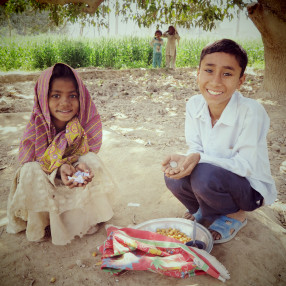As the sole provider in his household, Deedar Ali’s biggest challenge is doing his schoolwork and keeping pace with his peers. He is 7 years old and a DIL student.
“The more I walk in the fields and through the market with my tray full of chickpeas and masala, the more I sell, so it’s hard for me to justify going home early to do my homework sometimes….â€
Deedar’s other mission: Giving advice to the girls he sees working in the fields.
“I tell them to go to school, I give them my own example, I work and I go to school, even if I am very tired, I like to learn to read and write…. I feel so happy in school, I wish all children could feel safe and happy.â€
It is only when he leaves the schoolyard that Deedar’s chest begins to tighten as the burden of being his mother’s sole provider weighs on him:
“I only make 50 rupees some days, those days I keep massaging the coins in my hand and I keep crying all the way home, because I know my mother will be sad, she used to work hard for us as housemaid, but then she got sick.â€
Deedar’s father divorced his mother, leaving her with three sons. Deedar is the youngest and the only one willing to help her eke out a survival existence.
“I have two older brothers, they work as laborers, and I fight with them everyday, but they refuse to give my mother money, they come home drunk, and one day I will kick them out, when I am large enough. But for now I will just sell chickpeas to protect my mother. They says let her starve, she is useless. I cry when I hear that. But when they leave I tell her about the stories I read in school, she likes that.â€
©Fatima Najm (@fatimazn), cofounder of Creatives Against Poverty

